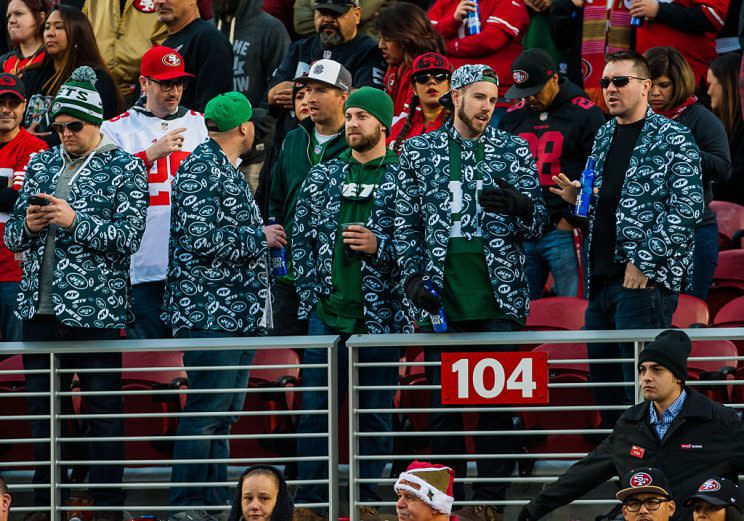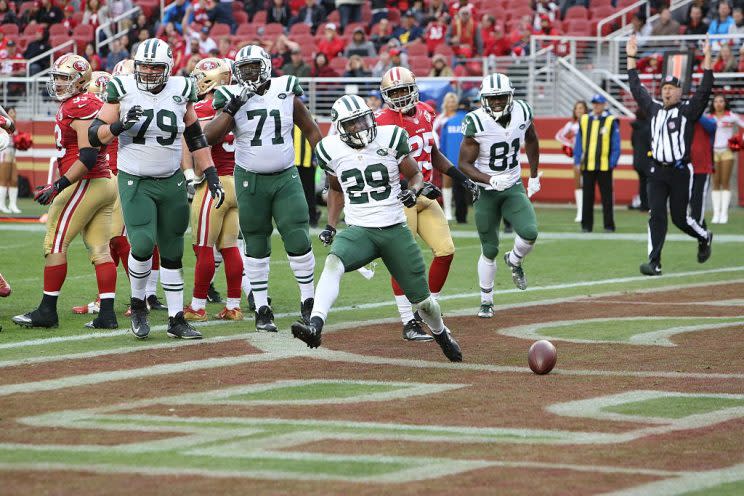Juggernaut Index, No. 32: Jets last in fantasy power rankings

Reminder: The Juggernaut Index is not a power ranking of NFL teams. Instead, this series is our annual ranking and review of NFL franchises for fantasy purposes — repeat: FANTASY purposes. We’re concerned only with a team’s likely contributions to the fantasy player pool. We aren’t interested in projected wins and losses. Around here, the focus is exclusively on yards and points. We begin with the league’s least useful teams, working our way toward the elite fantasy squads.
[Fantasy Football is open! Sign up now]
Here, in three tweets from our friends at Rotoworld, you will find all the explanation you need regarding the Jets’ placement at the bottom of this year’s index:
McCown ‘far and away’ best QB during OTAs https://t.co/s2iCEVD63w
— Rotoworld Football (@Rotoworld_FB) May 30, 2017
Hackenberg struggled in warmups last year https://t.co/xVBHQbjJv4
— Rotoworld Football (@Rotoworld_FB) May 21, 2017
Jets OC: We’re going with committee backfield https://t.co/lipEiYjgW7
— Rotoworld Football (@Rotoworld_FB) May 23, 2017
New York was a terrible football team last season, finishing with a point differential of -134 and ranking dead last in the league in interceptions (25), team passer-rating (67.6) and turnover differential (-20). This year, as you can see above, the Jets offer one of the worst quarterback situations in memory, along with a backfield committee. New York’s receiving corps is full of flawed and damaged players, and the offensive line isn’t anything special.
If you’re a Jets fan who came here looking for fantasy sunshine, um … well … here’s the best I can do:
• Bilal Powell is a very nice player — not a star, not a foundational back. But certainly a nice player. He was a bright spot for an otherwise unwatchable team in the final four games last season, averaging 138.0 scrimmage yards per week and scoring three times.
• Rookie third-round receiver ArDarius Stewart might be somethin’, eventually. But probably not this year, considering New York’s hopeless QB situation. Stewart was limited by an uninteresting passing game at Alabama, yet he still managed to catch 54 balls for 864 yards and eight scores in 2016. He’s strong, competitive, a nice weapon in the short passing game. He’s dealing with a thumb injury at the moment.
• Second-year receiver Robby Anderson is a fast dude. He ran a 4.34 40-yard dash at his pro day coming out of Temple, and his field-flipping speed was apparent late last season. Anderson delivered four receptions of 40-plus yards during a five-game stretch in the second half of 2016, reaching the end-zone twice. And then he was a dud in the final two weeks. And he was arrested during the offseason.
That’s pretty much all the good news I’ve got concerning the Jets. Everything beyond this sentence is tinged with derision or disgust. You have been warned, Gang Greeners.

It’s almost unfathomable that a pro franchise would allow its QB depth chart to look anything like New York’s. Josh McCown, entering his age-38 season, is pretty clearly the team’s best option, and he is no longer a credible NFL starter. As a backup, cool. As a starting QB, no. He threw as many picks as TD passes for the Browns last year (6) while posting a passer rating of 72.3. Still, McCown was clearly better in 2016 than Bryce Petty, who completed just 56.4 percent of his throws over six games for the Jets, tossing seven interceptions and only three TDs. Petty is not the answer.
Ridiculously, this franchise used a second-round pick last year on Christian Hackenberg, a player who was barely functional at the collegiate level. He never completed 60 percent of his throws in any of his three seasons at Penn State, averaging just 6.8 yards per attempt in his college career. His best season with the Nittany Lions was his first, and it wasn’t anything special. I genuinely cannot believe an NFL team has dedicated coaching and developmental resources to Hackenberg. If he ever sees the field for New York, fantasy owners will want to stream any defense that opposes him.
Eric Decker remains, as of this writing, New York’s best/only quality receiver. He’s 30 years old and returning from significant shoulder and hip surgeries, and he’s been the subject of offseason trade speculation. He’s also just one year removed from an 80-catch, 12-touchdown campaign. This team’s disastrous quarterback predicament would make Decker a poor bet to reclaim WR1 fantasy status even if he had no medical red flags. Still, someone on this squad is going to see 130-or-so poor-quality targets. Decker has a shot at a modest statistical revival. Ideally, he’d be flipped to another team.
Stewart is an interesting enough player in deep dynasty drafts, though he shouldn’t be one of the first five rookie receivers selected. His specialty at Alabama was turning short-range touches into big plays. It won’t be much of a surprise if he finds himself with an early starting role, but that’s really an indictment of this team’s receiving corps. Quincy Enunwa led all Jets in receiving yards (857) and scores (4) last season, yet he finished outside the top-40 players at his position in fantasy scoring. In a low-yield offense like New York’s, he remains a low-ceiling player.
Anderson has an arraignment hearing set for June 6, so we’ll know a bit more about his legal entanglements soon. Even without the off-field concerns, his place in the Jets’ receiving hierarchy was going to be challenged by Stewart. He doesn’t merit serious consideration in redraft leagues of standard size.
Tight end Austin Seferian-Jenkins has reportedly undergone a needed lifestyle transformation, addressing a drinking problem, shedding weight and generally getting serious about his pro career. Great news, obviously. ASJ’s talent was never in question. He’s suspended for the season’s first two games, however, so he shouldn’t be on anyone’s draft radar. New York used a fifth-round draft pick on tight end Jordan Leggett, a key big-game receiver for Clemson in each of the past two seasons. First-year players at his spot almost never make a fantasy splash, however. No need to have Leggett’s name on your cheat sheet, except in rookie drafts.

New York’s two-man backfield committee is going to be a constant source of irritation for the many Powell zealots in the fantasy expert community. Powell set new career highs in all meaningful categories last year, including rushing yardage (722), yards per carry (5.5), receptions (58) and touchdowns (5). He’s a quality multi-purpose back, no question. It’s not crazy to project that backfield touches will tilt Powell’s way in 2017 following his breakout campaign. But if you’re expecting a 70/30 workload split in his favor — or 65/35, or something similar — then you’re very likely to be disappointed. We can’t just wish away Matt Forte. Yes, Forte is three years older than Powell, but No. 22 still handled 248 touches for the Jets last season. He’s going to play.
It sounds as if the most likely scenario (which is also the most sensible) is that Powell and Forte will rotate from series to series. Such is life in 2017 for most NFL backs. Neither of the primary New York RBs will ever land inside the top-10 in our weekly position ranks unless the other guy is injured. To me, the 30-pick gap between Powell’s early ADP and Forte’s seems ridiculous. It leaves little profit potential for the Powell drafters. This team’s offense won’t spend an inordinate amount of time near the goal line, so you can’t expect either RB to make more than, say, five or six visits to the end-zone.
New York’s defense should not be drafted in standard-size fantasy leagues. This D is coming off a year in which it ranked 28th in points allowed (25.6), 29th in interceptions (8) and 29th in sacks (27). A healthier Muhammad Wilkerson will certainly help, as will the addition of LSU rookie safety Jamal Adams, an intriguing IDP. The Jets’ schedule is no picnic, not with matchups against the AFC West and NFC South. It’s really a shame this group will receive no official credit for all those practice pick-sixes against Hackenberg & Co.
—
2016 Offensive Stats & Ranks
Points per game – 17.2 (30)
Pass YPG – 216.6 (27)
Rush YPG – 112.6 (12)
Yards per play – 5.3 (20)
Plays per game – 62.7 (24)
—
Previous Juggernaut Index entries: 32) NY Jets
Follow the Yahoo fantasy crew on Twitter: Andy Behrens, Dalton Del Don, Brad Evans, Brandon Funston, Liz Loza, Scott Pianowski and Tank Williams



